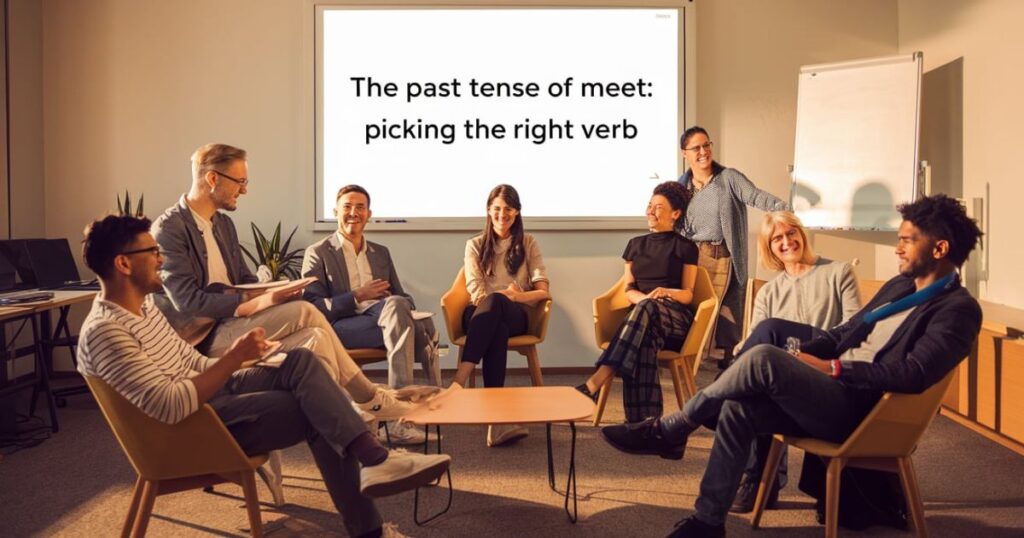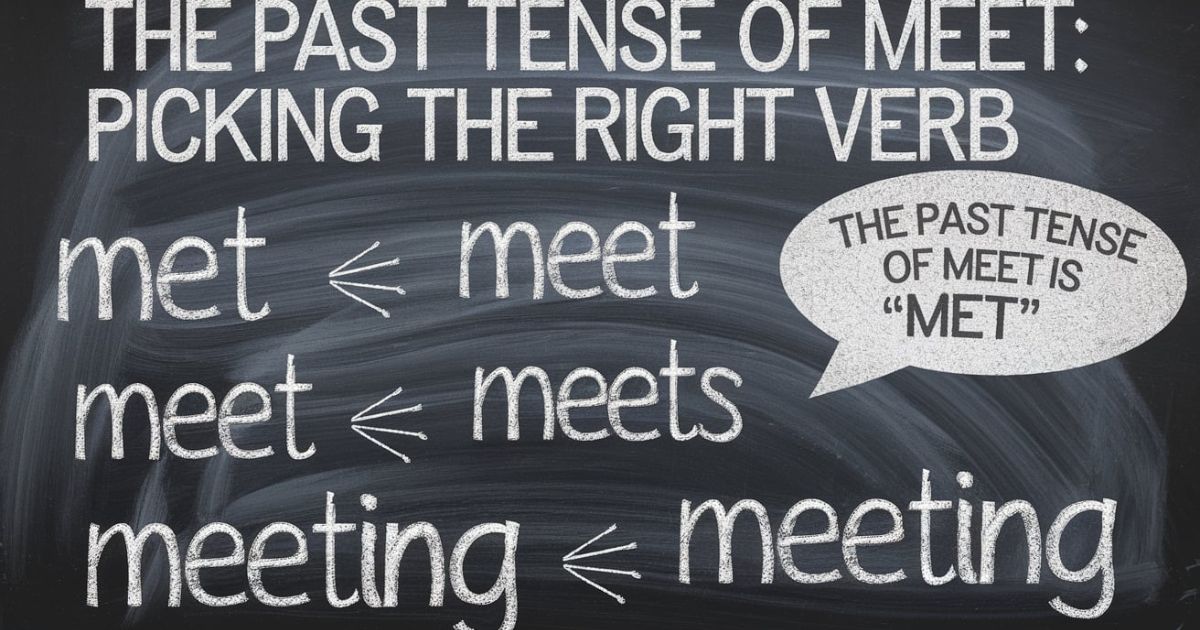The word “meet” is one we use all the time, whether we’re talking about meeting a friend or introducing ourselves to someone new. But when it comes to the past tense, things can get a little tricky. Do you use “meet” or “met”? How do you pronounce it? What does it really mean? Don’t worry!
We’ll break it down for you in simple terms, so by the end, you’ll know exactly how to use “meet” and its past tense “met” without any confusion.
How to Pronounce the Past Tense of “Meet” i.e “Met”
The past tense of “meet” is “met”. It’s pronounced like /mɛt/, which sounds a lot like words such as “pet” or “let”. The sound is short and quick, especially with the letter “e” in the middle. Here’s how to pronounce it clearly:
- Start with a soft “m” sound, like you’re saying “me.”
- Then, move to the short “e” sound, like in the word “net.”
- Finish with a crisp “t” sound, made by quickly touching the roof of your mouth with your tongue.
It’s important to get that final “t” sound clear so people can tell you’re using the past tense of “meet.”
READ MORE: Totalling or Totaling: Which Spelling to Use?
What does the Word “Meet” Mean
The verb “meet” has a simple meaning: it’s when two or more people come together. This can happen physically, like when you meet someone in person, or virtually, like meeting over a video call. But it doesn’t stop there. “Meet” can also mean to “encounter” something for the first time, like a new experience or a challenge.
For example:
“I will meet my teacher after school.” (You’re coming together in person.)
“I need to meet the project deadline.” (Here, you’re fulfilling a requirement.)
It’s a versatile word that helps describe many kinds of interactions.
The Simple Verb Tense Table
Understanding how to use “meet” and “met” across different tenses is key. Here’s a simple table to help you see how the verb changes in both positive and negative forms, as well as in questions:
| Tense | Affirmative | Negative | Interrogative |
| Present Simple | I meet my friend. | I do not meet my friend. | Do I meet my friend? |
| Present Continuous | I am meeting my friend. | I am not meeting my friend. | Am I meeting my friend? |
| Present Perfect | I have met my friend. | I have not met my friend. | Have I met my friend? |
| Past Simple | I met my friend. | I did not meet my friend. | Did I meet my friend? |
| Future Simple | I will meet my friend. | I will not meet my friend. | Will I meet my friend? |
Origin of the Word “Meet”
The word “meet” has been around for a long time. It comes from Old English where it was spelled “metan.” Even though the spelling has changed a little, its meaning has stayed the same. For centuries, people have used “meet” to talk about coming together with others. The next time you meet someone, you’re carrying on a tradition that goes back hundreds of years!
Usage of “Meet” and “Met” in Everyday Conversations

Now that you know what “meet” means and how to say “met,” let’s look at how to use them in everyday speech. Both forms are common, but they have different uses depending on when the action takes place.
Using “Meet” in Present Tense:
When you use “meet” in the present tense, you’re talking about something happening right now or something that happens regularly.
- “I meet my friends for lunch every Saturday.”
- “Let’s meet at the park after school.”
- “Do you want to meet the new teacher?”
These examples show how you can use “meet” when you’re referring to now or the future.
Using “Met” in Past Tense:
When you use “met”, you’re talking about something that already happened.
- “Yesterday, I met my cousin at the mall.”
- “She met her teacher for the first time last week.”
- “We met a lot of interesting people at the event.”
Here, “met” shows that the meeting happened in the past.
Synonyms of “Meet” and “Met”
Sometimes, you might want to use a word other than “meet” or “met.” Fortunately, there are many synonyms that mean the same thing but give your writing a little variety.
Synonyms of “Meet” (Present Tense):
- Encounter: “I encounter new challenges every day.”
- Convene: “The team will convene at noon.”
- Gather: “Let’s gather at my house after school.”
- Connect: “We connect online to discuss homework.”
These synonyms can be used when you want to talk about meeting in the present.
Synonyms of “Met” (Past Tense):
- Encountered: “I encountered a famous author last week.”
- Convened: “The board convened for a special meeting.”
- Gathered: “They gathered at the park for a picnic.”
- Ran into: “I ran into an old friend yesterday.”
These words work when you’re describing meetings that have already happened in the past.
Tips for The Past Tense of Meet: Picking the Right Verb
When choosing between “meet” and “met,” remember a few key tips:
- Use “met” when you’re talking about the past. It shows that the meeting already took place.
- Use “meet” when you’re talking about something happening in the present or the future.
- If you’re unsure, think about when the meeting is or was happening. The time is the biggest clue.
- Don’t forget about pronunciation. When you say “met,” make sure to finish with a clear “t” sound, so people know you’re talking about the past.
ALSO READ: How past tense of run Changes in the Past and Past Participle
Conclusion
Meet is a simple yet powerful verb that helps describe many interactions in life. Its past tense, “met,” is just as important, and knowing how to use both forms correctly can make your conversations and writing clear and effective.
Whether you’re meeting someone today or met them yesterday, you now have all the tools you need to pick the right verb. Plus, with a few helpful synonyms in your back pocket, you can add some variety to your speech and writing. Practice makes perfect, so keep an eye out for opportunities to use “meet” and “met” correctly in your daily conversations!

Osbert is a skilled linguist and educator specializing in English grammar and vocabulary. With years of experience, he has dedicated his career to helping learners enhance their language skills. Osbert is passionate about simplifying complex grammar concepts and is the founder of EnglishInfoz.com, a platform focused on English language education.
